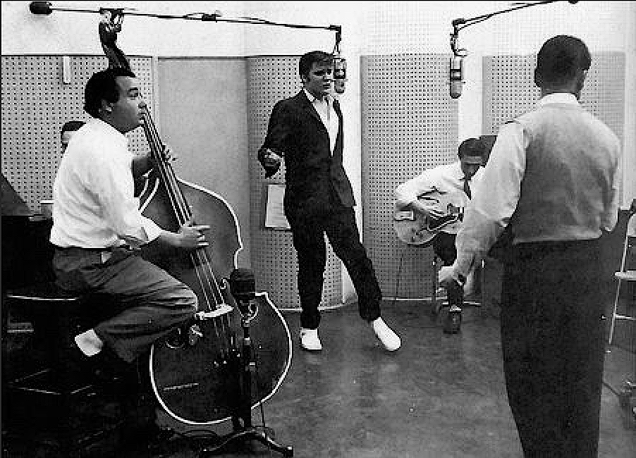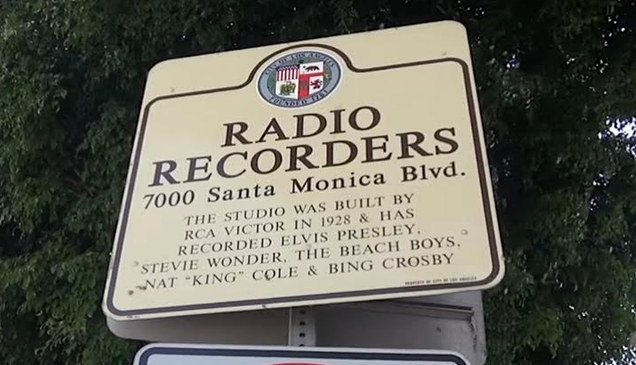Plus this 1977 song sounds much better without the singing and the lyrics. The point is made by the guitars -- nothing more needed.
Login with Patreon to view this post
A curious conversation on Facebook Messenger…sorry.
Jeff [last name redacted]: “Watched The Man Who Shot Liberty Valance with the kids last night. It didn’t hold up much. However, I was singing the ‘end credits’ Gene Pitney song during the whole film, and then when we got to the end…no song. I looked it up and realized that I had originally seen the film on TV in the 70s and the song was not in the actual film, but some guy at the TV station must have overlaid it on to the end credits. Curious if you’ve ever heard of this weird TV artifact?”
HE: “’Some guy at the TV station’ couldn’t have overlaid or inserted the Gene Pitney song onto the end credits because there is no end credits sequence in Liberty Valance. It just ends with a final static shot of the moving train (25 mph!) that James Stewart and Vera Miles are riding on and then ‘The End.’ Maybe the TV station guy played the song over a black background or an artificial freeze frame.”
Jeff: “My memory is a bit foggy so I don’t know. I do know my brother and I sang the song for a month after we saw it, so the song and the film are inextricably entwined for us. Maybe John Ford had a sudden worry that the film would seem too light with a pop song bringing it home. Thanks for your two cents.”
HE: “What I told you isn’t my ‘two cents’ — it’s fact. The Man Who Shot Liberty Valance doesn’t have an end-credits sequence. And it’s a stupid song anyway. It celebrates the awesome six-shooter bravery of the man who stood up to the evil Liberty Valance face to face and shot him dead. Stewart’s Ransom Stoddard character isn’t celebrated, but there’s a line that says “when the final showdown came at last, a law book was no good.”
Jeff: “A song doesn’t have to be smart to be catchy. I suppose the idea is that they were both somehow brave or noble. Stewart for standing up to Valance and Wayne for letting Stewart live, knowing that Vera Miles preferred him.”
What are the odds, I asked myself, that in the Joe Biden era a bunch of half-in-the-bag Millennial-aged Navy pilots would stand around and sing "Great Balls of Fire," a 65-year-old pop song that predates peak boomer-cycle music ('60s and '70s)? What are the odds that even one of these guys, presuming he/she is a classic rock aficionado, would be able to recite the lyrics to this Jerry Lee Lewis tune like their social security number?
Login with Patreon to view this post

It's my earnest belief that the best things in life...the things that we tend to regard as the best things in life, I should say...are things that happen on their own...randomly, curiously, suddenly, quietly, oddly and sometimes even annoyingly. But they always drop in.
Login with Patreon to view this post
BEST MOTION PICTURE – DRAMA
The Power of the Dog (Netflix)
BEST PERFORMANCE BY AN ACTRESS IN A MOTION PICTURE – DRAMA
Nicole Kidman, Being the Ricardos
BEST PERFORMANCE BY AN ACTOR IN A MOTION PICTURE – DRAMA
Will Smith, King Richard
BEST MOTION PICTURE – MUSICAL OR COMEDY
West Side Story (20th Century Studios / Walt Disney Studios Motion Pictures)

BEST PERFORMANCE BY AN ACTRESS IN A MOTION PICTURE – MUSICAL OR COMEDY
Rachel Zegler, West Side Story
BEST PERFORMANCE BY AN ACTOR IN A MOTION PICTURE – MUSICAL OR COMEDY
Andrew Garfield, Tick, Tick…Boom!
BEST MOTION PICTURE – ANIMATED
Encanto (Walt Disney Studios Motion Pictures)
BEST MOTION PICTURE – NON-ENGLISH LANGUAGE (FORMERLY FOREIGN LANGUAGE)
Drive My Car (Japan / Janus Films)
BEST PERFORMANCE BY AN ACTRESS IN A SUPPORTING ROLE IN ANY MOTION PICTURE
Ariana DeBose, West Side Story
BEST PERFORMANCE BY AN ACTOR IN A SUPPORTING ROLE IN ANY MOTION PICTURE
Kodi Smit-McPhee, The Power of the Dog
BEST DIRECTOR – MOTION PICTURE
Jane Campion, The Power of the Dog
BEST SCREENPLAY – MOTION PICTURE
Kenneth Branagh, Belfast
I gradually came to respect Lin Manuel Miranda‘s Tick Tick…Boom (Netflix, now streaming). I was even emotionally affected by it in the second half, but man, what a struggle. Mine, I mean.
Based on Larson’s 1990 stage musical of the same name, it’s about Larson himself (Andrew Garfield) struggling and feeling desperate and anxious and needing so hard to get his material produced and seen…to get up and over…he constantly sweats and strains and feels awful about not being a success at age 30, and the movie puts you right into the misery pit with the poor guy, and it’s no picnic, let me tell you.
Tick, Tick…Boom is a “musical based on a musical about writing a musical”, and I’m telling you that the first 20 or 25 minutes of this film, directed by Lin Manuel Miranda, will make you go “oh, no…please, no.” I was in agony. Garfield is pushing so hard, turning on the “charm” and emphatic personality, singing with a not-great singing voice, so much “sell” in his performance…buh-bo-buh-bo-bo!
Art isn’t easy, but watching a poor, exhausted, stressed-out guy trying to make good art isn’t easy either.
But after 30 or 40 minutes of torture I began to settle into the story and I began to feel and even identify with Larson’s pain. I’ve been there. In ’78 and ’79 I was poor as a churchmouse and living in a Soho cockroach flat and trying to get rolling as a movie critic and interviewer, and my theme song was Gerry Rafferty‘s “Baker Street.” (“And you’re cryin’, you’re cryin’ now”) I know all about that agony and fear and desperation so don’t tell me.
Incidentally “Baker Street” is a much catchier and more arresting tune than anything in Larson’s Tick Tick score. Sorry.
Friendo to HE: “I hate all of the people in this thing. People don’t talk like this in real life. It’s very 2021. They’re all talking in woke-speak. It’s the modern left’s idea of the perfect sensitive person movie, Except nobody will give a single shit about it.”
HE to Friendo: “I groaned when Susan, his LatinX-woman of color girlfriend (Alexandra Shipp), left him because he’s too consumed in his work. Earth to Susan: All creatively-driven types are consumed by their work. It goes with the territory. The real loves of Larson’s life were, of course, his music and Stephen Sondheim.
Friendo to HE: “I felt badly for his plight but this script is just terrible.”
HE to Friendo: “And for all of it, we don’t get the grand payoff that is Larson’s Rent….Rent is years away when the film ends. I took Jett with me to see Rent at the Nederlander when he was eight or thereabouts, and he wasn’t a fan.”

During a visit to Memphis in early February 2009, I did a quickie tour of four tourist attractions — Graceland, Sun Studios, the Lorraine Motel and Beale Street. I was gratified to find that Sun Records, the small recording studio that was begun by the great Sam Phillips in 1950 and the place where Elvis Presley recorded his first few tunes, is a homey little shrine — an old-time funky studio and souvenir shop that reeks of the mid ’50s.
After tapping out yesterday’s riff about Baz Luhrman‘s Elvis (Warner Bros., 6.4.22), it hit me that I’ve never once visited the former site of Radio Recorders, where Presley recorded “All Shook Up” — easily the coolest and most popular hit single of his career — on 1.19.57.
Radio Recorders was located at 7000 Santa Monica Blvd.. two blocks east of La Brea and a 14-minute drive from my place. (Nine minutes on the rumblehog.) I’ve been living in this cutthroat, dog-eat-dog town for nearly 40 years and it never even occured to me to visit this historic rock ‘no roll site. What’s wrong with me?



The Rolling Stones have retired “Brown Sugar” from their stage show. An oft-performed track from their classic, half-century-old Sticky Fingers album, it’s a raunchy stomper about the sexual savoring of women of color. The lyrics use wicked images of 19th Century slave trade minglings as a fetid atmospheric element — the same hothouse that produced Richard Fleischer’s Mandingo (‘75).
I never processed “Brown Sugar” as anything more than a bad-boy taunt with erotic icing flung about. But in today’s context none of this works and so the song is toast.
Mick Jagger and Keith Richard have implied that the song’s excommunication may be temporary, and that it may return when the cultural mood shifts back into a semblance of sanity. Have they been talking to Ted Sarandos?
From a 10.13 TMZ story:

Hands down, the most transporting version of Harry Warren and Al Dubin‘s “I Only Have Eyes For You” was recorded in late 1958 by The Flamingos. What makes it work is the reverb plus the background singers doing the old two-part-harmony “sha-bop sha-bop“. But for years and years I thought they were singing “kah-LUCK-kah-luck.”
The reason I was a kah-LUCK-kah-lucker for so long is a brief scene in Billy Wilder‘s The Apartment (’60). Consolidated Life of New York executive Al Kirkeby (David Lewis) is ushering his office girlfriend Sylvia (Joan Shawlee) into the Upper West Side apartment building of C.C. Baxter (Jack Lemmon) for an assignation, and as she climbs the stairs of Baxter’s brownstone Sheila is singing “kah-LUCK-kah-luck.” Sheila’s improv stuck in my mind.
The Apartment was shot in the fall of ’59 — “I Only Have Eyes For You” was released in April ’59, and was pretty much the definitive romantic song of the moment.

Don Was‘s I Just Wasn’t Made For These Times (LIVE, ’95) remains the best Brian Wilson documentary ever made. Brent Wilson and Jason Fine‘s Brian Wilson: Long Promised Road, which recently played the Tribeca Film Festival and which I saw last night, is okay for what it is but nowhere near as good.
It’s basically footage of Wilson and Fine, a Rolling Stone editor and longtime friend of the 78 year-old musical genius and Beach Boy maestro, driving around Los Angeles and visiting locations from Brian’s past. And what it boils down to is an intimate portrait of a good, gentle soul, but one who is clearly a bit twitchy and beset by unruly currents.
Honestly? Long Promised Road felt a bit exploitive. It made me feel awkward, uncomfortable. I felt sorry for Brian. He’s a good soul but I felt as if he was being subjected to a fair amount of discomfort in speaking to Fine. There was a medium close-up of Brian performing that reminded me that he reads his own lyrics off a teleprompter. It’s good that he gets out and performs, but there’s something creepy about the film. I felt badly for him.
Friendo: “I met Wilson in 1995, and he could barely carry on a conversation — and that’s true in the film as well. And obviously, he can’t sing anymore. But I don’t find any of that creepy. That’s just who Brian Wilson is, and my honest feeling is: It’s good that he survived, and has a life. He hasn’t written a memorable song in decades, but ‘Smile’ — the 2004 version — is one of my all-time favorite records. I think even now, he radiates the energy of a good soul.
HE to Friendo: “Yes, a good soul. A good heart. I’m glad he’s still plugging away. But the doc still felt a bit cruel. Fine is a decent guy but the very act of training a camera lens on poor Brian flirts with heartless exploitation — I was saying to myself, ‘Jesus, they should leave the poor guy alone.’ A gentle soul but quite twitchy. Kid gloves.”
Condolences offered to the fans, friends and family of the irrepressible Gerry Marsden, the smiling, spirited leader of Gerry and the Pacemakers and a cultural ambassador for Liverpool over the last 56 years. Marsden died yesterday at age 78.
I wouldn’t call Gerry and the Pacemakers a one-note, flash-in-the-pan group, but they pretty much stopped mattering when serious British bands began shifting out of spunky pop formula and into the next phase (deeper lyrics, complex recordings, psychedelic imaginings) in ’66 or thereabouts.
Their big songs were “How Do You Do It?”, “I Like It”, “You’ll Never Walk Alone”, “Don’t Let The Sun Catch You Cryin'” and “Ferry Cross the Mersey”.
In any event we can’t all be lion tamers. Gerry is/was a beloved figure among long-of-tooth Liverpudlians. The poor guy had ticker troubles going back to a triple bypass heart operation in ’03. Marsden had a second heart operation in 2016. He announced his retirement in November 2018.
…except in this instance, the mishearing is better than the actual lyric.
“Sway” a song recorded by Dean Martin in the ’50s, is heard over the closing credits of Jonathan Glazer‘s Sexy Beast, which I saw for the first time 20 years ago at the Toronto Film Festival and which I happened to re-watch last night on HBO Max**.
In the third stanza the “Sway” lyrics read as follows: “Other dancers may be on the floor / Dear, but my eyes will see only you / Only you have the magic technique / When we sway I go weak.”
I’ve watched Sexy Beast several times over the last two decades, and every time at the end of this stanza Martin sings “I go wheee.” Which is a much better line. The guy is head over heels with a new lover, and when the randy mood builds and builds he says “wheee!” to himself like a kid on a rollercoaster. Do you understand how much better that is than “I go weak”?

<div style="background:#fff;padding:7px;"><a href="https://hollywood-elsewhere.com/category/reviews/"><img src=
"https://hollywood-elsewhere.com/wp-content/uploads/2019/08/reviews.jpg"></a></div>
 Really Nice Ride
Really Nice RideTo my great surprise and delight, Christy Hall‘s Daddio, which I was remiss in not seeing during last year’s Telluride...
More » Live-Blogging “Bad Boys: Ride or Die”
Live-Blogging “Bad Boys: Ride or Die”7:45 pm: Okay, the initial light-hearted section (repartee, wedding, hospital, afterlife Joey Pants, healthy diet) was enjoyable, but Jesus, when...
More » One of the Better Apes Franchise Flicks
One of the Better Apes Franchise FlicksIt took me a full month to see Wes Ball and Josh Friedman‘s Kingdom of the Planet of the Apes...
More »
<div style="background:#fff;padding:7px;"><a href="https://hollywood-elsewhere.com/category/classic/"><img src="https://hollywood-elsewhere.com/wp-content/uploads/2019/08/heclassic-1-e1492633312403.jpg"></div>
- The Pull of Exceptional History
The Kamala surge is, I believe, mainly about two things — (a) people feeling lit up or joyful about being...
More »  If I Was Costner, I’d Probably Throw In The Towel
If I Was Costner, I’d Probably Throw In The TowelUnless Part Two of Kevin Costner‘s Horizon (Warner Bros., 8.16) somehow improves upon the sluggish initial installment and delivers something...
More » Delicious, Demonic Otto Gross
Delicious, Demonic Otto GrossFor me, A Dangerous Method (2011) is David Cronenberg‘s tastiest and wickedest film — intense, sexually upfront and occasionally arousing...
More »


